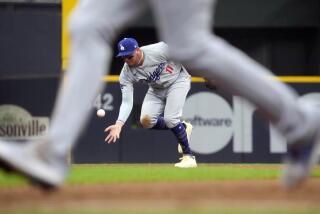BABES IN BEER LAND : With Nieves, Wegman and Plesac, Brewer Pitching Staff Has Youth to Burn
- Share via
Youth hasn’t been served in Milwaukee; it has been catered to, waited on hand and foot. Brewer Manager George Bamberger needs a crib, not a dugout, to house a starting rotation that includes a grand total of 2 years 110 days of major league experience.
“Bambi’s Babies” include Juan Nieves, 21, barely old enough to drink in some states. Nieves says “of course” a lot, has begun meeting with financial advisers and acts as if there’s nothing particularly special about the assembled Brewer baby boomers.
“The veterans were not doing the job, and maybe some of it was budget,” he says.
Next is Bill Wegman, who is 6-6, 220 and looks as if he curls John Deere tractors for fun. The Brewers asked Wegman, 23, to join them near season’s end in 1985. He started three games, won two. His 26-day stay convinced him that Vancouver, site of the Brewer Triple-A team, is a nice place to visit but he wouldn’t want to play there again.
“I think a lot of people get caught up in the age thing,” he says.
Ted Higuera and Tim Leary, both 27 and the other two starters in Bamberger’s four-man rotation, each have a little more than a year’s worth of major league service. Rookies no more, but close.
Then there is Dan Plesac, 24, once a starter, now a reliever. Plesac, too, has a farmboy face, full of innocence, and a golly-gee-whiz manner. But ask him if this experiment of using part youth, part nerve will work, and the smile leaves quickly.
“Yeah, it’s going to work,” he says. “I’m very confident it’s going to work.”
So here are the Brewers, those trend-setters of sorts, trying hard to capture success by the arms of babes. They aren’t the first ones to attempt this sort of thing. The New York Mets and Kansas City Royals owe a hefty number of wins to their farm systems. The Royals won the World Series last year, and the Mets seem to be on their way this season, all on the strength of pitching staffs light on age.
This season, it is the turn of the Brewers and Texas Rangers to pluck pitchers from their minor league teams. To make way, the Brewers have discarded pitching relics like Rollie Fingers and Rick Waits. Pete Vuckovich retired because of injuries. Moose Haas was traded to the Oakland A’s.
All of this was made possible by an unexpected fall in the standings following the 1982 World Series. Back then, the Brewers were 95-67, Harvey’s Wallbangers and all that. Home runs were their best friends, pitching was an afterthought.
The next year, they finished in fifth place in the Eastern Division, 11 games back. In 1984, it was worse--last place, 36 1/2 out. And nothing to write home about in 1985, what with a 71-90 record and a sixth-place finish that left them 28 games behind the winners. Attendance was down, morale sagging.
The old, creaky Brewers needed help.
“This club started to go down the drain in ‘83,” Bamberger said. “In ‘84, it did go down the drain. And in ’85 it was down the drain.”
Enough was enough. General Manager Harry Dalton and Bamberger decided to take a chance.
“It was a combined idea,” Bamberger said. “Dalton and I both felt the same way: ‘Hey, let’s go with the young kids.’
“But they have to be ready to pitch. This is the first year that we could say we were ready to go with kids. So that’s why Harry’s made a clean sweep here. And it will be cleaned even more next year. I mean, you can’t keep this young talent back. You can’t. The question is, how will they do?”
So far, so good. Nieves is 2-1 with a 3.23 earned-run average. “He’s done nothing but win in every situation we’ve put him in,” Bamberger said. “He’s 2-1 for us now, but it could be more.”
Wegman is 0-2 with a 4.34 ERA, but Bamberger said he has had just one poor performance in his six starts.
Higuera is 4-2, and Leary is 3-2. Plesac is 1-1 with two saves.
“The young kids, what they’re doing is keeping us in the ballgame,” Bamberger said.
Nieves didn’t spend much time (about two seasons) in the Brewer minor league system. Didn’t have to. Left-handers with 90-m.p.h. fastballs are rare commodities.
On the final day of training camp, Nieves said, he kept waiting for someone to tell him that he was being sent to Vancouver. That was before Brewer pitching coach Herm Starrette stopped to shake his hand.
“You’re in the rotation,” Starrette said.
Nieves said thank you, as if Starrette were handing him a cup of coffee or letting him borrow a quarter.
“It’s not a gamble,” he said. “It’s, ‘Let’s see who can do it.’ You’re not going to get paranoid about anything. You pitch and do your best. That’s all you can do. There’s no fear involved.”
Wegman is the same way. “It’s obvious by watching these guys throw that they’re not scared,” he said. “I include myself in that. We’re competitive and we’ve got a lot of heart.”
Wegman was a Class A pitcher two seasons ago. So bright was his future that the Brewers considered promoting him straight to the majors. He ended up in Vancouver, where he tried to imitate a power pitcher rather than settle for what he does best, which is to coax hitters into grounding out, not striking out.
Wegman pitched well in the spring and was named the Brewers’ No. 4 starter. Fine with him. He would sweep the dugout floors if it meant a place on the roster.
Wegman remembers his first start, a September game against the Boston Red Sox last season. The Brewers were headed nowhere.
But to Wegman, this was a playoff game, a chance.
“I was nervous going down to the bullpen,” he says. “I was shaking in my boots. But once I got to the mound, I was comfortable. I said, ‘Jeez, this is what it’s all about.’ ”
He finished seven innings, allowed five hits, two earned runs, no walks, “four punch-outs and no decision,” he said. “That’s when I knew my stuff was good enough to pitch in this league.”
Plesac endured a similar indoctrination this spring. The Brewers invited 23 pitchers to camp, probably figuring that Plesac would be gone soon. But soon Bamberger was saying things like, “I’ve got to find a place for him.”
His first spring training game was against the Angels at Palm Springs. “There was Downing, Pettis, Jackson, DeCinces, Ruppert Jones, you’re talking about some outstanding major league ballplayers,” he said.
Plesac’s first pitch to Downing, a fastball that he was awfully proud of, became a hard line drive. “I thought, ‘Oh boy, this is the big leagues. These guys can hit.’ ”
But Plesac survived and allowed one run in his three innnings of work. No more intimidation.
“You listen to some of the coaches and managers in the minors and they make it seem like you can throw a 95-m.p.h. fastball, 90-m.p.h. slider and not get these guys out,” he says. “It’s like you almost have to have Nolan Ryan’s stuff to get these guys out consistently. That’s what you have to get over.”
So they have. Nieves is calm and collected, 21 going on 30. Wegman and Plesac are happy to be here, but not awed. Brewer management is the most pleased, what with watching the kids outgrow their crib.
More to Read
Go beyond the scoreboard
Get the latest on L.A.'s teams in the daily Sports Report newsletter.
You may occasionally receive promotional content from the Los Angeles Times.










